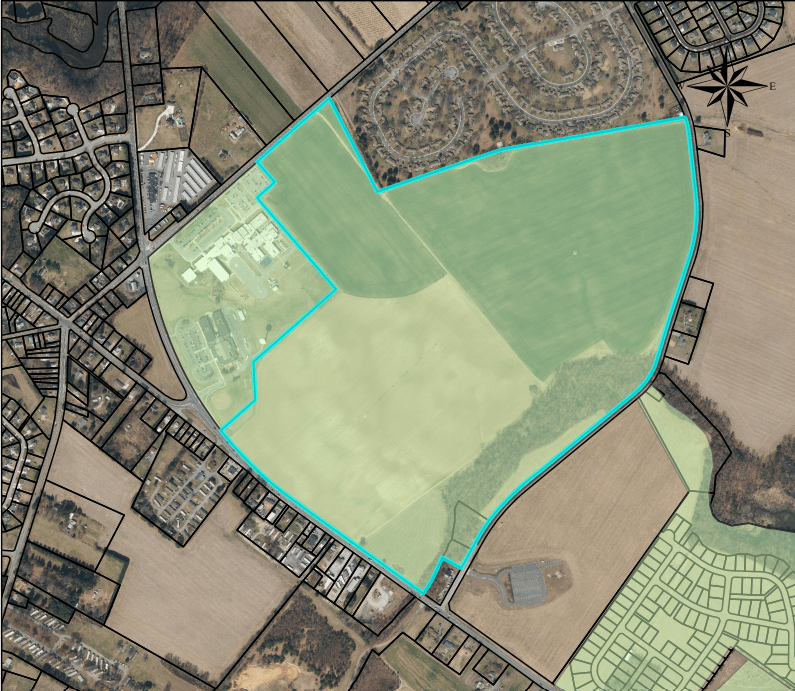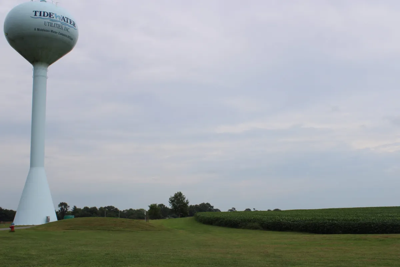Spotlight Delaware is a community-powered, collaborative, nonprofit newsroom covering the First State. Learn more at SpotlightDelaware.com.
In August, the Caesar Rodney School Board asked state education officials for permission to purchase a nearly $10 million piece of land, near Camden, from its own elected board vice president.
Although the deal would have lost money for the board member, David Failing, the district never publicly disclosed his involvement, raising questions around transparency.
The five-member school board steadily formed the plan over the past year, but its members did not reveal during public meetings that the potential seller of the 207 acres next to Postlethwait Middle School on South State Street was a member of their school board.
Failing also did not abstain from a vote in August on a motion to submit the district’s land purchase request to the Delaware Department of Education. That formal request – called a certificate of necessity – does disclose that Failing is the current owner of the property.
In an interview with Spotlight Delaware, Failing acknowledged that a plan for a school board member to buy land and sell it back to a school district looks odd. But, he said, it isn’t out of the ordinary in districts, like his, in Kent County.
“This is not unusual for our culture,” Failing said.
Failing also described how his purchase last year of the empty rural flatland came at a fortuitous time for the district.
The Caesar Rodney School District wanted the land in order to replace the Charlton School, which serves students with disabilities from kindergarten until adulthood. But at the time it didn’t have the money, and board members feared that developers in the lively real estate market would instead buy it to build new homes.
Then, in the summer of 2024, Failing sold his lumber company for what he said was “a whole lot of money that most people don’t deal with.”

His subsequent purchase of the Camden-area land gave him “a really big safe spot to park” the money, he said. It also allowed the him to hold the property for the school district to acquire at a later date.
Asked whether the land purchase allowed him to also defer tax payments from the sale of his company’s property, Failing said it did not. In fact, he says he planned to lose about $1 million on the sale of the land to the school district.
The loss, he said, represents a culture of giving back to Caesar Rodney schools – a district with one of the lowest tax rates in the county but with the highest number of students, according to its superintendent.
Ultimately, the school district and Failing will have to wait at least a year to carry out the sale.
On Friday afternoon, Delaware Department of Education spokesperson Alison May said in an email that the state would not approve any school district requests submitted in August for capital budget expenditures. In the email, May cited budget limitations.
Delaware school districts must obtain a certificate of necessity for capital projects that cost more than $1 million.
 A rendering from a land-use application shows a piece of land that the Caesar Rodney School District wants to acquire to replace the Charlton School. SOURCE: DELAWARE PLUS
A rendering from a land-use application shows a piece of land that the Caesar Rodney School District wants to acquire to replace the Charlton School. SOURCE: DELAWARE PLUSWhat are the ethics rules?
Prior to the education officials’ decision on Friday, Spotlight Delaware had asked the state’s ethics body, called the Public Integrity Commission, to comment on the facts of Failing’s potential land purchase.
The commission declined to comment directly, but its chairman Ron Chaney said in an emailed statement that the Delaware code of conduct generally requires any state employee “to recuse themselves from participating in the review or disposition of a matter in which they have a personal or private interest.”
Asked about the commission’s statement, Failing said he is not a state employee, but added that he would “abstain from any board action involving the potential sale of that property” if state officials approve it in the future.
Caesar Rodney’s superintendent, Corey Miklus, also told Spotlight Delaware in early October that the district has a statement prepared to announce that Failing owns the property. But, he said, the time to release it would be after the state approves the district’s request to buy the land from Failing for $9.6 million.
Asked on Friday whether the district would submit another request next year to purchase the land, board President Jessica Marelli said the district has not yet made a decision regarding future certificate of necessity submissions.
 Delaware Education Secretary Cindy Marten. PHOTO COURTESY OF DEPT OF EDUCATION
Delaware Education Secretary Cindy Marten. PHOTO COURTESY OF DEPT OF EDUCATIONMarelli said that the need that led the district to submit the request isn’t going away, “so it’s likely we’ll revise them and submit again next year.”
Spotlight Delaware also asked May for a comment from Education Secretary Cindy Marten on Caesar Rodney’s intention to buy property from its own school board member. May in response said “the Secretary does not oversee school boards.”
‘There was a deadline’
About five months before Failing purchased the 207 acres last fall, the Caesar Rodney Board of Education met with Wilmington-based ABHA Architects to begin drafting a certificate of necessity to submit to the state, according to documents from an April 2024 board meeting,
A month later, the board submitted a Preliminary Land Use Service application, which allows state agencies to provide input on land development projects.
The application stated that the landowners at the time, Beiser Group LLC, agreed “to allow Caesar Rodney School district to begin” the land-use review process for the property.
The following August, the district submitted a certificate of necessity to purchase a 43-acre chunk of the land for $2.2 million. That request, which the state ultimately rejected last year, stated the district’s intent to replace the Charlton School.
That same month last year, a press release announced that Failing sold his lumber company, Wyoming Millwork Co. to Builders FirstSource Inc., a $13 billion, Texas-based company.
Failing subsequently purchased the entire 207-acre plot of land near Camden for $11 million from the Beiser Group.
When asked, Failing said the school board had not yet heard back from the state about their request to buy the smaller chunk of the land before he made his purchase.
 Caesar Rodney Superintendent Corey Miklus | PHOTO COURTESY OF CRSD
Caesar Rodney Superintendent Corey Miklus | PHOTO COURTESY OF CRSDFailing did say that he spoke with board members individually and during confidential executive session meetings prior to purchasing the land. And he told them that he was prepared to sell the land for at least $1 million less than what he bought it for, he said.
Failing also noted that the school board had tried to buy the land six years ago but was unable to because, he said, they could not pass a referendum.
“There was a deadline. It was going to be developed and sold, so I purchased it,” Failing said.
Miklus, the Caesar Rodney superintendent, said the district was lucky that Failing bought the property, because “the window on that land was closing fast.” He also said that overcrowding in district schools would have been worsened if a developer had purchased the land and built more homes.
Last spring, district conversations about purchasing the land started again, and the school board in August submitted another certificate of necessity seeking permission to buy the full 207 acres for $9.6 million.











(0) comments
Welcome to the discussion.
Log In
Keep it Clean. Please avoid obscene, vulgar, lewd, racist or sexually-oriented language.
PLEASE TURN OFF YOUR CAPS LOCK.
Don't Threaten. Threats of harming another person will not be tolerated.
Be Truthful. Don't knowingly lie about anyone or anything.
Be Nice. No racism, sexism or any sort of -ism that is degrading to another person.
Be Proactive. Use the 'Report' link on each comment to let us know of abusive posts.
Share with Us. We'd love to hear eyewitness accounts, the history behind an article.